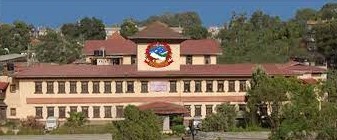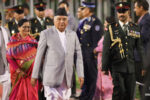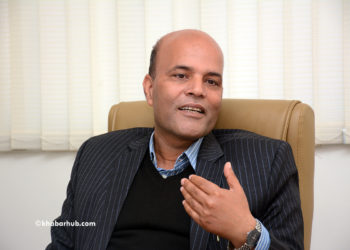KATHMANDU: Years into its establishment, the National Archives is grappling with a shortage of human resources and budget.
So much so, the only authorized body of the country to preserve the valuable manuscripts and documents systematically and safely is making do with only 20 staff out of the total 30 quotas.
Due to the lack of human resources and budget, the National Archives is finding it hard to preserve the documents of national and historical importance to meet the government’s goals, said the Archives Director General Saubhagya Pradhananga.
“The budget for the next fiscal year, 2023/24 has not paid its attention to the management of the documents of national importance. The budget has decreased as compared to the current fiscal year. As a result, the collection of audio and visual materials and their preservation may come to a halt,” he said.
According to Pradhananga, over Rs 40 million has been allocated for the current FY, 2022/23 and although the same budget has been allocated for the next FY, programmes have decreased.
“We lack workforce and budget to preserve important documents,” he complained.
The Archives has put up the issue of a lack of budget and human resources for the collection and preservation of the documents of national importance in the Delegated Management and Government Assurance Committee under the National Assembly.
The committee, in response, has directed the respective bodies of the government to act accordingly for the preservation of the documents.
It has also assured of calling a meeting of the stakeholders in this regard. As a result, a study of hundreds of manuscripts has yet to be carried out, it has been said.
History of the Archives According to history, in 1812 BS, Girvanayuddha Bikram Shah ordered the recording of government documents at the Basantapur Palace in a systematic way.
Later, the documents were shifted to Thapathali Palace in 1847 BS and again transferred to Durbar High School in 1853 BS.
The documents were later shifted and kept in the library in Ghanta Ghar called Bir Library.
The present National Archives is the extended form of Bir Library. Run from an apartment in the Hanumandhoka Palace in the first place in 1867 BS, it was shifted to its new building at Ramshahpath in 2030 BS.
The Archives building was constructed with the investment from India. Rare manuscripts and other important documents about Nepal’s history and cultures dating back the fifth century has been kept in the Archives.
The Archives has stored documents about various languages, Nepali papers, and manuscripts including ‘Tadpatra’, ‘Bhojpatra’, and ‘Nilpatra’ that go back to the seventh century.
Other stored manuscripts include ‘Das Bhumishwor’ of the fifth century, ‘Skandapuran’ that was written in Uttarlichhavi script in 810, ‘Sardharmapundarik Sutra’ written in ‘Tadpatra’ in the eighth century, ‘Binayapitaka’ written in ‘Tadpatra’ in the 11th century, ‘Karanyabyuhasutra’ in the 12th century, ‘Nyayabikasini’, the authorised law during the rule of Jayasthiti Malla in 1380, ‘Lankawatar’ related to Ayurveda in Nepal Sambat 28 and the ‘Nishwasatatwo Sanhita’, a scripture related to Shaiwatantra during the ninth century, that is enlisted on the Memory of The World Register under the UNESCO, among others.
Many government documents including ‘Lal Mohar’, ‘Syaha Mohar’, ‘Sandhipatras’, ‘Sawals’, ‘Chitthipatras’, ‘Ek-chappers’, ‘Kukkas’ and ‘Khadganisan’ have also been recorded alongside a collection of copper plates, records of civil servants, government publications and newspapers, rubbings of the stone inscriptions.
The Archives has stored world’s rare and invaluable scriptures and documents, said the Archives Director General Pradhananga.
Original copies of around 32,000 manuscripts, around 20,000 documents, 10,000 Tibetan scriptures, copies of microfilm of 200,000 scriptures and other documents have been recorded, he said.
It has also recorded documents relating to the land at Kumari Chowk, the original copies of Divyopadesh (a collection of teachings) of Prithivi Narayan Shah, the unifier of modern Nepal, and old ‘Tamasuk’ (land transaction deeds).
Although it has recorded all types of documents that are important historically, culturally, religiously and archeologically, the government documents have failed to make their way to the Archives, resulting in failure to implement commitments by the Ministry of Culture, Tourism and Civil Aviation for all government offices to submit government documents that date 25 years to the Archives, he said.
As a result, the government documents have been scattered, he added.
There is increasing number of people including researchers and students visiting the Archives who ask for copies of stored documents, he said.
Provision of submitting documents of national importance There is a provision that the documents of national importance should be recorded in the Archives.
Without the knowledge about the provision or negligence on the part of authority concerned, only a few of the documents have been handed to the Archives, said research officer at the Archives, Manita Neupane.
Even the submitted documents have been in the dilapidated and unmanaged condition, according to her.
Various seminars and training sessions have been organised, in coordination with the respective ministry, departments and offices, on the study and management of the documents to be recorded in the Archives.
This aims to ensure that the documents to be recorded are safe and well managed, she said.
Similarly, people have been encouraged by presenting them with awards and honours to donate the documents of national importance in their private collection in view of history, religion, culture, literature and economy and other aspects, she added.
The Archives aims to develop into an international archive centre by collecting the documents of national and international importance at home and abroad, it has been said.
Some documents of national importance have been kept in archives and museums in various countries.
Efforts are underway to bring back these documents (if possible) or at least their copies, said Pradhananga.
Researchers and students from foreign countries including Germany, the United States, Japan, South Korea, Thailand, China, India and Bangladesh have demanded that the National Archives provides them access for carrying out a study of stored documents.
So to attract such researchers, there is a need to develop the Archives as a research centre by improving its service delivery, he said.
The Archives has come up with a plan to go digital and provide the audio and visual services, said its officials.
(Purna Bahadur Mishra/RSS)









Comment